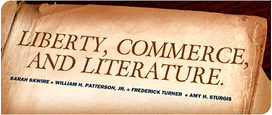Frederick Turner: The issue that I’d like us to address is this. As Bill says, the Enlightenment classical liberal position, despite Reagan and Thatcher, has become a minority view in our culture–even an amusing eccentricity for the popular press when it features the Libertarian party and Ron Paul. Bill also points out that those ideas need to be kept alive until the present nanny state has bankrupted itself.
The big mistake that classical liberalism made, however, was to abandon the realm of culture–the arts and literature–to the various apostles of Blut und Boden, heroic class struggle, “caring” statism with its Arts Councils, and the special interests of sexual, ethnic, religious, regional, and lifestyle minorities–all of whom regarded rational debate, markets, the ethics of civility and respect, and individualism as the enemy. The Republic of Letters fell because it came to ignore the arts and literature, which were immediately claimed by Nazi, communist, fascist, and socialist forms of modernism and postmodernism.
The challenge now is to recover a robust realm of art and literature that recognizes the deep beauty of human liberty, rationality, and enterprise (science fiction is a promising holdout in this respect).
There is very little patronage–in the form of endowed prizes, periodicals, educational institutions, museums, presses, commissions, etc–for arts that flout the anti-Enlightenment consensus. Beauty has been saddled with the label of kitsch. If our novels, poems, movies, paintings, plays and architecture all implicitly tell us to pay more taxes to support “fairness” and “progressive” social activism instead of creating the wealth and technology that will open up everybody’s future, that’s what we are going to get.
William H. Patterson, Jr.: Quite agree with Fred’s sentiments here. When lit’ry people let down their hair at conferences, one of the big laments is how big a gap has opened up between what for want of a better term we shall call “theory” and “practice.” Deep in their cups (tea, presumably), these academics will sometimes go so far as to admit that there is actually very little connect between the academy and the intellectual life of the nation, and that academic life is more pragmatically viewed as a gigantic job fair, with placement and advancement the prime considerations as to what may and may not be said.

